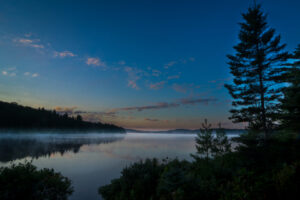
My father was a young man until at the age of 87, he had a stroke while fly fishing from his canoe on Kidney Pond, near Mt. Katahdin in Maine. He was in the act of casting a dry fly at a rising trout just before sunset when suddenly he was very dizzy and knew a stroke was coming. He put his fly rod down carefully in the canoe, slid off the seat and lay down in the canoe so that he wouldn’t fall out into the water and drown. Then he threw up all over himself. The canoe drifted aimlessly in the middle of the lake while the sky above him darkened, the stars came out, and he realized he couldn’t move his right arm or leg. The whole right side of his body was paralyzed.
He knew that his friends at Kidney Pond Camp where he was staying would check to see if he had returned, because that’s what all the fishermen did for each other every evening when they got back. Soon they’d get in their canoes and come looking for him. But my father wasn’t the kind of person who lay around waiting for others to do for him what he could do for himself. With his left hand, he patted around himself until he found his paddle, and he started to paddle home. I still don’t know how he managed to reach up over the gunwale with only one hand, while lying down, and get any leverage on the water – nor how in the world he knew which direction to paddle since he could only see straight up. He was only a few hundred yards from the dock in front of his cabin when two of his friends found him and towed him the rest of the way home. The right side of his face was also paralyzed, the skin and the muscles beneath it sagging. He could talk, but only haltingly, and his words were slurred.
It was several hours before the ambulance arrived from Millinocket and took him to the hospital there. The next day my father was transferred in a private plane to the Greenwich, CT Hospital, near his and my mother’s home. I got the news in London where I was attending a conference and rushed home on the earliest plane I could get, and the first thing I saw when I walked into his hospital room was my father sitting up in bed trying to chin himself from a bar that hung above him from the ceiling on two wires like a trapeze. A nurse stood beside the bed, one hand on his paralyzed hand, squeezing it for him around the bar.
“Hi, Dad,” I said, as cheerily as I could. He didn’t answer. Instead, he raised his eyes to the bar above him, and pointed to it with his chin, as if to say ‘Don’t interrupt.’ He made the same grimace of exertion I’d seen a thousand times, widening his mouth, baring his teeth, squinting his eyes almost shut, and strained to lift himself, willing the muscles of his right arm to activate – commanding them to do their job, the way they always had for 87 years. They disobeyed. He tried again, and once again. And still again. Each time the left side of his body would rise a slight amount, and his right would not – he was a boat with a list to starboard. At last, the nurse took his right hand off the bar and laid it down beside him on the bed, like someone putting something back in a bureau drawer. “We’ll try again, this afternoon,” she said.
It was no surprise to anyone who knew the power of my father’s will that he got the use of the right side of his body back, along with a full command of speech. The stroke had done no harm to his prodigious intellect; it stayed intact until very near the end ten years later. Nevertheless, at the moment of the stroke, he finally became an elderly man. Before that time, the adjective just didn’t fit. After it, he never got back enough of even the mild athleticism it requires to put a canoe in the water and paddle out into a lake, nor to hike through the woods, to outlying lakes carrying his fly rod and his lunch. His timing at tennis doubles became so abominable it rendered the game impossible. He and my mother made the decision to trade independence for security, and moved into a retirement complex. My brother drove them from the house on the shore of Long Island Sound they’d lived in for fifty years to this new place where everything would be taken care of until they were dead.
“As we drove out of the driveway, they never looked back,” my brother told me, his voice full of wonder. “They looked straight ahead.”

Leave A Comment